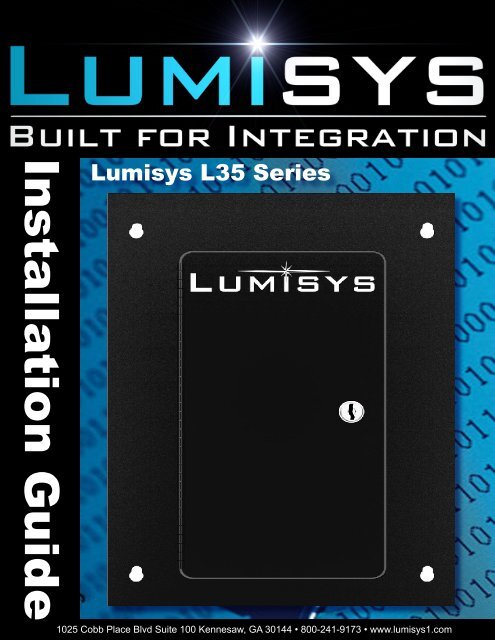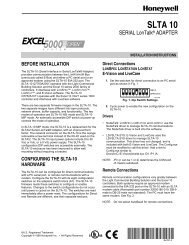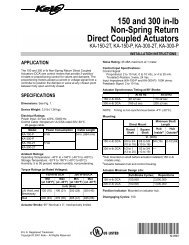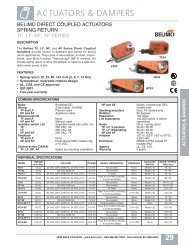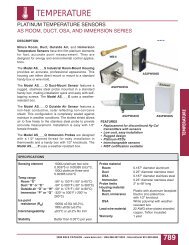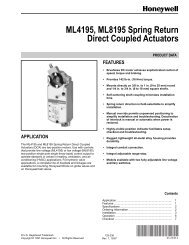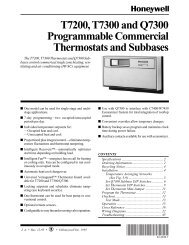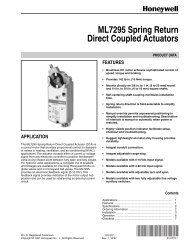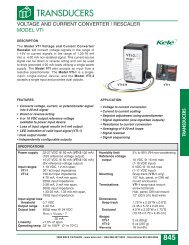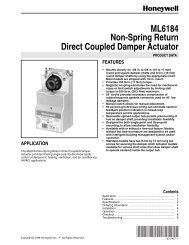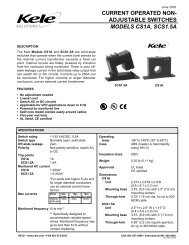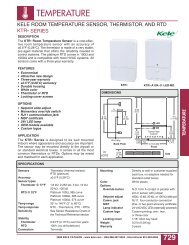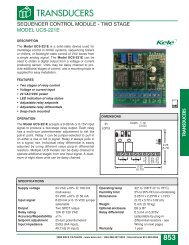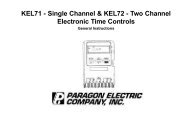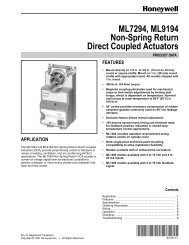Installation guide - Kele
Installation guide - Kele
Installation guide - Kele
Create successful ePaper yourself
Turn your PDF publications into a flip-book with our unique Google optimized e-Paper software.
<strong>Installation</strong> Guide<br />
Lumisys L35 Series<br />
1025 Cobb Place Blvd Suite 100 Kennesaw, GA 30144 • 800-241-9173 • www.lumisys1.com
L35 Series<br />
<strong>Installation</strong> Guide<br />
ATTENTION<br />
This section serves as a notice of the immediate or potential dangers involved when working<br />
with the equipment described throughout this manual. Any person involved in installation,<br />
maintenance, or service of the equipment should first carefully examine the equipment and<br />
read the instructions contained in this manual to ensure that personal and/or equipment injury<br />
is avoided.<br />
The following safety messages are used throughout this manual to alert of immediate or<br />
potential danger to life or property:<br />
Hint Indicates a tip or trick to help you.<br />
Note Indicates an important note.<br />
DANGER! Indicates an immediately hazardous situation which,<br />
if not avoided, will result in death or serious injury.<br />
WARNING! Indicates a potentially hazardous situation which, if<br />
not avoided, can result in death or serious injury.<br />
CAUTION: Indicates a potentially hazardous situation which, if not<br />
avoided, can result in minor or moderate injury.<br />
CAUTION: Used without the safety alert symbol, indicates a potentially hazardous<br />
situation which, if not avoided, can result in personal or<br />
property damage. Failure to comply with proper handling of the Lumisys<br />
products may void your warranty<br />
In addition, this symbol may appear in the margin of specific portions of text as a safety<br />
reminder. Applicable instruction steps will be listed beneath the symbol.<br />
Disclaimer<br />
This equipment has been tested and found to comply with the limits for a Class A digital device,<br />
pursuant to part 15 of the FCC Rules. These limits are designated to provide reasonable<br />
protection against harmful interference when the equipment is operated in a commercial<br />
environment. This equipment generates, uses, and can radiate radio frequency energy<br />
and, if not installed and used in accordance with the instruction manual, may cause harmful<br />
interference to radio communications. Operation of this equipment in a residential area is likely<br />
to cause harmful interference, in which case the user will be required to correct the interference<br />
at his own expense.<br />
Instructions contained in this user’s <strong>guide</strong> should be performed only by qualified persons in<br />
accordance with local and national codes. Lumisys ® Lighting and its affiliates assume no<br />
responsibility for any consequences related to the improper use of this manual.<br />
www.lumisys1.com<br />
Due to continuous product improvement, Lumisys reserves the right to change product specifications without notice.<br />
Page
L35 Series<br />
<strong>Installation</strong> Guide<br />
Table of Contents<br />
L35 Series<br />
Parts List - Factory Assembled Method ............................................................................................................4<br />
Ordering Example of Factory Assembled L35 ...............................................................................................4<br />
Lumisys LTR Relay ...................................................................................................................................................4<br />
Parts List - Unassembled “Can Ahead” Method ...............................................................................................5<br />
Ordering Example of Unassembled L35 ............................................................................................................5<br />
Parts List - Additional Accessories - LEXP-35 ...............................................................................................6<br />
Parts List - Additional Accessories - LDIV35 ...............................................................................................7<br />
Ordering Example of Factory Assembled L35 with an LDIV35 .....................................................................7<br />
Overview ............................................................................................................................................................................8<br />
Wiring Applications<br />
Lumisys Open Protocol ......................................................................................................................................9<br />
BACnet over Ethernet ......................................................................................................................................9<br />
BACnet IP .............................................................................................................................................................10<br />
BACnet over Arcnet ................................................................................................................................................10<br />
BACnet over MS/TP ................................................................................................................................................11<br />
BACnet PTP .............................................................................................................................................................11<br />
Modbus RTU .............................................................................................................................................................12<br />
Modbus ASCII ................................................................................................................................................12<br />
N2 / Metasys ................................................................................................................................................13<br />
SBT / The APOGEE System ....................................................................................................................................13<br />
<strong>Installation</strong><br />
Mounting the L35 Series Enclosure .......................................................................................................................14<br />
Connecting the Power Supply .......................................................................................................................15<br />
Connecting the Power Supply .......................................................................................................................16<br />
Connecting Branch Circuit Wires .......................................................................................................................17<br />
Connecting Switch Inputs .......................................................................................................................19<br />
Connecting Lumisys LS5 Photocell Inputs ..........................................................................................................21<br />
Connecting the RS-485 Network .......................................................................................................................22<br />
Adding and Removing LTR Relays<br />
To Remove a LTR Relay ....................................................................................................................................23<br />
To Add a LTR Relay ....................................................................................................................................23<br />
Upgrading the L35 Series<br />
Installing the Switch Input Expansion Board ..........................................................................................................24<br />
Connecting Expansion Board Switch Inputs ..........................................................................................................27<br />
Installing Digi-Touch Module (DDN-L35) ..........................................................................................................28<br />
Terms and Conditions of Sale ...................................................................................................................................30<br />
www.lumisys1.com<br />
Due to continuous product improvement, Lumisys reserves the right to change product specifications without notice.<br />
Page
L35 Series<br />
<strong>Installation</strong> Guide<br />
L35 Series<br />
Parts List - Factory Assembled Method<br />
Select Panel Type:<br />
Part #<br />
Description<br />
FACTORY ASSEMBLED PANELS*<br />
Maximum<br />
Relay Capacity<br />
Panel Power<br />
Switch<br />
Inputs<br />
Standard Light Level<br />
Sensor*** Inputs<br />
L3516 L35 SERIES LIGHTING PANEL 16 120/277 VAC 24 1<br />
L3532 L35 SERIES LIGHTING PANEL 32 120/277 VAC 24** 1<br />
L3548 L35 SERIES LIGHTING PANEL 48 120/277 VAC 24** 1<br />
L3560 L35 SERIES LIGHTING PANEL 60 120/277 VAC 24** 1<br />
Select Quantity of Relays:<br />
LTR RELAYS*<br />
Part #<br />
Description<br />
Lumisys LTR Relay<br />
Direct Override Switch**<br />
LTR<br />
LATCHING RELAY<br />
120/277 VAC<br />
with Direct Manual Override Switch**<br />
*LTR relays are ordered as separate line items.<br />
**Direct Manual Override resynchronizes with the panel controller on the next panel command.<br />
Note: Relays will arrive installed in interiors. If the relay quantity exceeds the panel capacity,<br />
the remaining relays will arrive in a separate carton.<br />
Relay<br />
Terminal<br />
Block<br />
Coil Pins<br />
Ordering Example of Factory Assembled L35<br />
(L35 Series with 18 relays - 16 Relay Max, 120/277 VAC)<br />
Part #<br />
Quantity<br />
L3516 1<br />
LTR 18<br />
In this example, the two relays<br />
which exceed the panel capacity<br />
(16) are shipped in a separate<br />
carton as spares.<br />
Panel Cover<br />
Panel Interior<br />
Lumisys recommends one spare<br />
relay be ordered with each panel.<br />
Spare Lumisys LTR relays: 2<br />
www.lumisys1.com<br />
Due to continuous product improvement, Lumisys reserves the right to change product specifications without notice.<br />
Page
L35 Series<br />
<strong>Installation</strong> Guide<br />
L35 Series<br />
Parts List - Unassembled “Can Ahead” Method<br />
Select the Enclosure Type:<br />
ENCLOSURE FOR ROUGH-IN<br />
Part #<br />
Description<br />
L3516-E ENCLOSURE ONLY FOR L3516-I<br />
L3532-E ENCLOSURE ONLY FOR L3532-I<br />
L3548-E ENCLOSURE ONLY FOR L3548-I<br />
L3560-E ENCLOSURE ONLY FOR L3560-I<br />
Select the Matching Interior and Trim:<br />
Part #<br />
Description<br />
FACTORY ASSEMBLED INTERIOR AND TRIM<br />
Maximum<br />
Relay Capacity<br />
Panel Power<br />
Switch<br />
Inputs<br />
Standard Light Level<br />
Sensor*** Inputs<br />
L3516-I INTERIOR & TRIM ONLY FOR L3516-E, 120/277 VAC 16 120/277 VAC 24 1<br />
L3532-I INTERIOR & TRIM ONLY FOR L3532-E, 120/277 VAC 32 120/277 VAC 24** 1<br />
L3548-I INTERIOR & TRIM ONLY FOR L3548-E, 120/277 VAC 48 120/277 VAC 24** 1<br />
L3560-I INTERIOR & TRIM ONLY FOR L3560-E, 120/277 VAC 60 120/277 VAC 24** 1<br />
Select Quantity of Relays:<br />
LTR RELAYS*<br />
Part #<br />
Description<br />
Lumisys LTR Relay<br />
Direct Override Switch**<br />
LTR<br />
LATCHING RELAY<br />
120/277 VAC<br />
with Direct Manual Override Switch**<br />
*LTR relays are ordered as separate line items.<br />
**Direct Manual Override resynchronizes with the panel controller on the next panel command.<br />
Note: Relays will arrive installed in interiors. If the relay quantity exceeds the panel capacity,<br />
the remaining relays will arrive in a separate carton.<br />
Relay<br />
Terminal<br />
Block<br />
Coil Pins<br />
Ordering Example of Unassembled L35<br />
(L35 Series with 29 relays - 32 Relay Max, 120/277 VAC)<br />
Part #<br />
Quantity<br />
L3532-E 1<br />
L3532-I 1<br />
LTR 29<br />
In this example, there are three<br />
unused relay spaces.<br />
Additional relays can be ordered<br />
in the future to fill these spaces as<br />
facility applications arise.<br />
Enclosuer<br />
Ships First<br />
for “rough in”<br />
Interior and Trim<br />
Ship later<br />
customer specified date<br />
www.lumisys1.com<br />
Due to continuous product improvement, Lumisys reserves the right to change product specifications without notice.<br />
Page
L35 Series<br />
<strong>Installation</strong> Guide<br />
L35 Series<br />
Parts List - Additional Accessories - LEXP-35<br />
The Lumisys LEXP Input Expansion Module provides additional switch input capacity for Lumisys control<br />
panels and Qwik-Kits. Each expansion board adds 32 switch inputs that can be field configured using our<br />
LPPK software. Each group of 8 inputs can be configured to accept up to 24VDC from independently<br />
powered devices using on-board jumpers.<br />
LEXP-35<br />
Part # Description Parts Included<br />
LEXP1-L35<br />
LEXP2-L35<br />
LEXP3-L35<br />
Increases switch input<br />
capacity from 24 to 56<br />
Increases switch input<br />
capacity from 24 to 88<br />
Increases switch input<br />
capacity from 24 to 120<br />
(1) EXPANSION MODULE WITH<br />
(1) 257110 MOUNTING PLATE and<br />
(1) 235104 CABLE<br />
(2) EXPANSION MODULES WITH<br />
(2) 257110 MOUNTING PLATES and<br />
(1) 235105 CABLE<br />
(3) EXPANSION MODULES WITH<br />
(3) 257110 MOUNTING PLATES and<br />
(1) 235106 CABLE<br />
LEXP1-L35 Switch Input<br />
Expansion Module<br />
(Cable and mounting<br />
plate not shown)<br />
Mounting Examples:<br />
LEXP<br />
Mounting<br />
position<br />
LEXP2-L35<br />
Requires L3548<br />
relay panel<br />
minimum.<br />
L35 Series<br />
Panel with no<br />
LEXP<br />
LEXP1-L35<br />
Requires L3532 relay<br />
panel<br />
minimum.<br />
LEXP2-L35<br />
Requires L3548<br />
relay panel<br />
minimum.<br />
www.lumisys1.com<br />
Due to continuous product improvement, Lumisys reserves the right to change product specifications without notice.<br />
LEXP3-L35<br />
Requires L3560<br />
relay panel<br />
minimum.<br />
Page
L35 Series<br />
<strong>Installation</strong> Guide<br />
L35 Series<br />
Parts List - Additional Accessories - LDIV35<br />
The Lumisys LDIV35 is a high voltage compartment divider for L35 Series Lighting Panels that provides the<br />
capability to separate normal and emergency circuits within the unit’s high voltage compartment. The LDIV<br />
mounts in a single relay position, reducing the overall panel capacity by one (1) relay.<br />
This device is used in installations that require the control of 120 and 277 volt lighting circuits or emergency<br />
lighting circuits.<br />
LDIV-35<br />
Part # Description Product Compatibility<br />
LDIV35 HIGH VOLTAGE COMPARTMENT DIVIDER FOR 120/277 VAC L35 Series Lighting Relay Panel<br />
Ordering Example of Factory Assembled L35 with an LDIV35<br />
(L35 Series with 18 relays - 16 Relay Max, 120/277 VAC)<br />
Part # Quantity<br />
L3516 1<br />
LTR 16<br />
LDIV35 1<br />
L35 Series (L3516)<br />
In this example, the LDIV35 takes one of the 16 relay positions. As the panel’s<br />
capacity is 16 relays or relay positions, the one additional relay which exceed<br />
the panel capacity (16) is shipped in a separate carton as a spare.<br />
Lumisys recommends one spare relay be ordered with each panel.<br />
Spare Lumisys LTR relays: 1<br />
LDIV35<br />
www.lumisys1.com<br />
Due to continuous product improvement, Lumisys reserves the right to change product specifications without notice.<br />
Page
L35 Series<br />
<strong>Installation</strong> Guide<br />
Overview<br />
This document provides instructions on how to install the Lumisys L35 Series Lighting Relay Panel.<br />
The <strong>guide</strong> contains three major sections:<br />
1) Overview<br />
2) Installing the L35 Series and<br />
3) Upgrading the L35 Series.<br />
The L35 Series comes in four basic units based upon relay capacities: L3516, L3532, L3548 and the L3560. Each unit may contain<br />
up to the number of relays indicated. Enclosure sizes for each of the four units will vary. Refer to the L35 Series Data Sheet for more<br />
information.<br />
Figure 1 show the L35 Series Lighting Relay Panel. The unit includes a painted steel enclosure with a overhanging plate and<br />
hinged door suitable for either flush or surface mounting. Electronics include L35 Series Controller (LMB) with on-board RS-485<br />
communication, Relay Interface Module(s) (16 contactors each), Ribbon cables, Relays, Power supply and Primary power fuse.<br />
The L35 Series is able to receive up to 120 programmable inputs, each requiring home-runs to the L35 Series. To avoid multiple<br />
home-runs of standard switches Lumisys recommends installing DDN Series Digital Switches. Refer to the Digital Override Switches<br />
data sheet on the website. Instructions for installing the DDN Module can be found under “Upgrading the L35 Series” in this manual.<br />
Figure 1<br />
4<br />
2<br />
1) Power Supply and fuse<br />
2) High Voltage Relays: L35 Series = 20 amp<br />
3) High Voltage Sections<br />
4) Controller<br />
5) 16 Relay Interface Board (behind controller, not shown)<br />
6) Low Voltage Section<br />
7) Enclosure with Removable Trim<br />
8) Hinged Door<br />
9) High Voltage Barriers<br />
10) Ribbon Cable Connection between CPU and Relay Interface<br />
7<br />
Enclosuer<br />
Removable Trim<br />
10<br />
1<br />
High Voltage<br />
Section<br />
3<br />
Low Voltage Section<br />
6<br />
High Voltage<br />
Section<br />
3<br />
9<br />
www.lumisys1.com<br />
Due to continuous product improvement, Lumisys reserves the right to change product specifications without notice.<br />
8<br />
Page
L35 Series<br />
<strong>Installation</strong> Guide<br />
Wiring Applications<br />
Lumisys Open Protocol<br />
Lumisys Open Protocol 2-wire EIA-485 Network<br />
Example Lightiing<br />
Network Devices<br />
L35 Series<br />
Lighting Panel<br />
L28 Series<br />
Lighting Panel<br />
LD200DIM<br />
Dimming Integration<br />
Module<br />
Lumisys<br />
Qwik-Kit<br />
BACnet over Ethernet<br />
24Vac<br />
BACnet over 10/100BaseT Ethernet<br />
2-wire EIA-485 on Port S2<br />
Example Lightiing<br />
Network Devices<br />
L35 Series<br />
Lighting Panel<br />
L28 Series<br />
Lighting Panel<br />
LD200DIM<br />
Dimming Integration<br />
Module<br />
Lumisys<br />
Qwik-Kit<br />
www.lumisys1.com<br />
Due to continuous product improvement, Lumisys reserves the right to change product specifications without notice.<br />
Page
L35 Series<br />
<strong>Installation</strong> Guide<br />
BACnet IP<br />
24Vac<br />
BACnet IP<br />
2-wire EIA-485 on Port S2<br />
Example Lightiing<br />
Network Devices<br />
L35 Series<br />
Lighting Panel<br />
L28 Series<br />
Lighting Panel<br />
LD200DIM<br />
Dimming Integration<br />
Module<br />
Lumisys<br />
Qwik-Kit<br />
BACnet over Arcnet<br />
24Vac<br />
BACnet over Arcnet<br />
2-wire EIA-485 on Port S2<br />
Example Lightiing<br />
Network Devices<br />
L35 Series<br />
Lighting Panel<br />
L28 Series<br />
Lighting Panel<br />
LD200DIM<br />
Dimming Integration<br />
Module<br />
Lumisys<br />
Qwik-Kit<br />
www.lumisys1.com<br />
Due to continuous product improvement, Lumisys reserves the right to change product specifications without notice.<br />
Page 10
L35 Series<br />
<strong>Installation</strong> Guide<br />
BACnet over MS/TP<br />
24Vac<br />
BACnet over MS/TP<br />
2-wire EIA-485 on Port S2<br />
Example Lightiing<br />
Network Devices<br />
L35 Series<br />
Lighting Panel<br />
L28 Series<br />
Lighting Panel<br />
LD200DIM<br />
Dimming Integration<br />
Module<br />
Lumisys<br />
Qwik-Kit<br />
BACnet PTP<br />
24Vac<br />
BACnet PTP<br />
2-wire EIA-485 on Port S2<br />
Example Lightiing<br />
Network Devices<br />
L35 Series<br />
Lighting Panel<br />
L28 Series<br />
Lighting Panel<br />
LD200DIM<br />
Dimming Integration<br />
Module<br />
Lumisys<br />
Qwik-Kit<br />
www.lumisys1.com<br />
Due to continuous product improvement, Lumisys reserves the right to change product specifications without notice.<br />
Page 11
L35 Series<br />
<strong>Installation</strong> Guide<br />
Modbus RTU<br />
modbus<br />
24Vac<br />
modbus RTU<br />
2-wire EIA-485 on Port S2<br />
Example Lightiing<br />
Network Devices<br />
L35 Series<br />
Lighting Panel<br />
L28 Series<br />
Lighting Panel<br />
LD200DIM<br />
Dimming Integration<br />
Module<br />
Lumisys<br />
Qwik-Kit<br />
Modbus ASCII<br />
modbus<br />
24Vac<br />
modbus ASCII<br />
2-wire EIA-485 on Port S2<br />
Example Lightiing<br />
Network Devices<br />
L35 Series<br />
Lighting Panel<br />
L28 Series<br />
Lighting Panel<br />
LD200DIM<br />
Dimming Integration<br />
Module<br />
Lumisys<br />
Qwik-Kit<br />
www.lumisys1.com<br />
Due to continuous product improvement, Lumisys reserves the right to change product specifications without notice.<br />
Page 12
L35 Series<br />
<strong>Installation</strong> Guide<br />
N2 / Metasys<br />
Ethernet IP / BACnet or N1<br />
Johnson Controls N2 BUS<br />
Johnson Controls NCM, NAE or NIE<br />
Network Control Module or<br />
Network Application Engine<br />
Example Lightiing<br />
Network Devices<br />
L35 Series<br />
Lighting Panel<br />
L28 Series<br />
Lighting Panel<br />
LD200DIM<br />
Dimming Integration<br />
Module<br />
Lumisys<br />
Qwik-Kit<br />
SBT / The APOGEE System<br />
LAN / WAN / TCP-IP<br />
Lumisys 2-wire EIA-485 Network<br />
Siemens Building Technologies<br />
MBC with Open Processor or<br />
Power MEC<br />
Example Lightiing<br />
Network Devices<br />
L35 Series<br />
Lighting Panel<br />
L28 Series<br />
Lighting Panel<br />
LD200DIM<br />
Dimming Integration<br />
Module<br />
Lumisys<br />
Qwik-Kit<br />
www.lumisys1.com<br />
Due to continuous product improvement, Lumisys reserves the right to change product specifications without notice.<br />
Page 13
L35 Series<br />
<strong>Installation</strong> Guide<br />
<strong>Installation</strong><br />
Mounting the L35 Series Enclosure<br />
1. Knockout Holes for high and low voltage conduit connections. Figure 2 illustrates areas in the L35 Series enclosure<br />
where conduit holes for high and low voltage wiring can be made.<br />
a. Remove the interior. If the panel was shipped with electronics installed, remove the interior with electronics until all holes<br />
for conduit are punched and all metal shavings are removed. Metal shavings from drilling could lodge in the electronic components<br />
and cause damage.<br />
The interior is held to the enclosure by four flange nuts. See Figure 2 below.<br />
Remove the interior and place it away from any work area before drilling holes for conduit.<br />
Figure 2<br />
Interior<br />
flange nuts<br />
(four total)<br />
Figure<br />
Mounting<br />
Holes<br />
(four total)<br />
2. Mount the enclosure with anchors and screws according to Figure .<br />
Figure illustrates the location of the panel mounting holes. The top two mounting holes of the panel enclosure are keyhole shaped<br />
so you can slide the unit over mounting screws, avoiding the need to hold the unit while trying to secure the mounting screws. Use<br />
wall anchors capable of supporting more than 80 pounds (60 relay unit).<br />
If flush mounting, secure the enclosure between the wall studs. Be sure to allow for the thickness of the drywall and 7/8” for the<br />
overhang of the cover so that the panel’s cover will mount flush on the finished wall and away from adjacent panels.<br />
www.lumisys1.com<br />
Due to continuous product improvement, Lumisys reserves the right to change product specifications without notice.<br />
Page 14
L35 Series<br />
<strong>Installation</strong> Guide<br />
Connecting the Power Supply<br />
The L35 Series can be powered by either 120 or 277VAC. A fuse and dual primary transformer are utilized to offer maximum flexibility<br />
during installation. This factory mounted transformer powers the L35 Series controller and associated low voltage coils on the<br />
contactors (relays).<br />
1. If connected, remove the power harness from the L35 Series controller. See Figure 4 for location of the harness<br />
on the controller. Remove the harness by lifting on the terminal block of the harness.<br />
2. Connect main power to the transformer and fuse assembly. Locate the Common (white) wire and the hot (black)<br />
wire for connection to main power. Each of these wires contains a “quick connect” connector. To connect a power wire to this connector,<br />
pinch the end of the connector to open it for wire insertion. Release the end of the connector with the wire inserted to allow<br />
the connector to hold. Figure 4 shows the connectors on the white and black wires.<br />
Figure 4<br />
Power harness<br />
from transformer<br />
(24VAC)<br />
“Quick-connect”<br />
Connectors for<br />
power supply<br />
www.lumisys1.com<br />
Due to continuous product improvement, Lumisys reserves the right to change product specifications without notice.<br />
Page 15
L35 Series<br />
<strong>Installation</strong> Guide<br />
Connecting the Power Supply<br />
3. Locate wire with correct voltage and connect to fuse. Refer to Figure 5. Power is connected by choosing the<br />
proper voltage wire stemming from the transformer and connecting that wire to the fuse holder. Each wire is labeled either 120V or<br />
277V. The 120V wire should be black, and the 277V wire should be brown. If this is not the case contact the factory immediately.<br />
Each wire is terminated with a spade connector that inserts over a contact on the fuse holder.<br />
Figure 5<br />
Transformer<br />
Blue<br />
24V<br />
Yellow<br />
White - Common<br />
Black - 120V<br />
Brown - 277V<br />
Replace with 1.0A<br />
Slow Blow Fuse Only!<br />
Fuse<br />
Select either 120 or 277V to HOT<br />
Black - HOT<br />
www.lumisys1.com<br />
Due to continuous product improvement, Lumisys reserves the right to change product specifications without notice.<br />
Page 16
L35 Series<br />
<strong>Installation</strong> Guide<br />
Connecting Branch Circuit Wires<br />
The L35 Series panel is equipped with contactors capable of switching up to 20 amperes at 277 VAC (Canadian versions,<br />
347VAC). Each contactor can be easily assigned to any of the unit’s zones.<br />
Refer to the Lighting Relay Panel Controller User’s Guide on the Lumisys website. Figures 7 and 8 are typical wiring<br />
diagrams. Be sure not to exceed 20 amperes per contactor. If the high voltage wiring requires both 120V and 277V, a<br />
Lumisys LDIV35 High Voltage Divider will be required.<br />
Steps 1-2<br />
WARNING! Disconnect high voltage power to all circuits before connecting them to the<br />
L35 Series. Failure to do so could result in serious injury.<br />
1. Pull branch circuit wires through high voltage conduit. Note: All wiring should be in accordance with local<br />
regulations and the National Electric Code. Control signal wiring to the low voltage side of the unit should not be run in the same<br />
conduit as line voltage wiring or other conductors that supply highly inductive loads such as generators, motors, or high voltage<br />
circuits located on the high voltage side of the unit.<br />
If 120V and 277V branch wires must be connected to relays on the same side of the panel do not run these wire through the<br />
same conduit. See Figure 2 for high (load) and low (24V) voltage areas of the panel.<br />
2. Install each branch circuit in one contactor as shown in Figure 6. Each branch circuit can be installed in a<br />
contactor as shown in Figure 6 below.<br />
Figure 6<br />
Lumisys LTR Relay<br />
Terminal opening to Circuit Breaker<br />
Terminal opening to Lighting Load<br />
Terminal opening to Circuit Breaker<br />
The Lumisys LTR Relay<br />
features manual override and<br />
large gauge terminal block<br />
capable of accomodating<br />
#14-8 AWG or two 10 AWG<br />
wires in each terminal opening.<br />
Terminal opening to Lighting Load<br />
www.lumisys1.com<br />
Due to continuous product improvement, Lumisys reserves the right to change product specifications without notice.<br />
Page 17
L35 Series<br />
<strong>Installation</strong> Guide<br />
Figure 7<br />
Lighting Load<br />
Fuse or Breaker<br />
L35 Series<br />
LTR Relay<br />
Lighting Load<br />
L35 Series<br />
LTR Relay<br />
Lighting Load<br />
Fuse or Breaker<br />
L35 Series<br />
LTR Relay<br />
Hot<br />
(size per<br />
N.E.C.)<br />
Neutral<br />
www.lumisys1.com<br />
Due to continuous product improvement, Lumisys reserves the right to change product specifications without notice.<br />
Page 18
L35 Series<br />
<strong>Installation</strong> Guide<br />
Connecting Switch Inputs<br />
The L35 Series Controller comes standard with 24 programmable switch input capacity. The 24 termination points are divided into<br />
three sections of eight, with each section containing one ground point ( all three grounds are common ). All points are numbered,<br />
and ground points are labeled “G”. Do not apply AC voltage to any of the terminals. Switch inputs location and labeling on the L35<br />
Series Controller are shown below.<br />
Figure 8<br />
J5<br />
Ground<br />
J7<br />
Switch inputs 17-24<br />
J6<br />
Ground<br />
Switch inputs<br />
1-8<br />
Switch inputs<br />
9-16<br />
Ground<br />
The inputs can be momentary on, momentary off, momentary on/off, maintained, linked, or state change. Each section has an<br />
accompanying jumper that sets whether its associated eight inputs will be up to 24 VDC or dry (0 VDC).<br />
Table 1 lists the switch inputs and associated jumpers.<br />
Table 1<br />
Switch Input Section Associated Jumper<br />
1- 8 J6<br />
9-16 J7<br />
17-24 J5<br />
www.lumisys1.com<br />
Due to continuous product improvement, Lumisys reserves the right to change product specifications without notice.<br />
Page 19
L35 Series<br />
<strong>Installation</strong> Guide<br />
Each jumper set has 3 pins, one of which is labeled “N”. The “N” jumper is for setting the switch inputs for dry<br />
contact. The “up to 24” pin of the jumper pin is not labeled. Figure 9 shows how to place jumpers properly.<br />
The jumper must be set before wiring.<br />
Figure 9<br />
Dry<br />
Position<br />
Up to 24V<br />
Position<br />
Note If one switch input is dry, the entire section of eight switch inputs must also be dry contacts,<br />
and the associated jumper must be in the “dry” position. If one switch input is externally powered up<br />
to 24 VDC, the entire section of eight switch inputs must also be up to 24 VDC, and the associated<br />
jumper must be in the “up to 24” position.<br />
LMB Switch Input<br />
Jumper Settings<br />
CAUTION! Before handling any components on the circuit board, the installer should be<br />
grounded to prevent damaging the board.<br />
1. Remove power to the controller. Refer to Figure 4. Remove the yellow/blue power harness by lifting on its terminator<br />
block.<br />
2. Set jumpers. See explanations and Figure 8, Figure 9 and Table 1.<br />
3. Connect the switches to the controller. Connect one end of the switch or contact to terminal “G” and the other to<br />
terminal “1-24”. Momentary switches which have both an ON and Off contact will require two switch inputs on the controller. See<br />
Figure 11 for sample wiring diagrams for each input type. Switch input terminal blocks are screw type. Land wires by unscrewing,<br />
inserting the stripped wire, and tightening the screw.<br />
4. Reconnect power to the controller.<br />
Figure 11<br />
Momentary On Pushbutton<br />
Each contact closure* activates assigned zone. In toggle mode each contact closure changes<br />
state of assigned zone.<br />
Momentary On Pushbutton<br />
Each contact closure* activates assigned zone.<br />
Momentary OFF Pushbutton<br />
Each contact closure* de-activates assigned zone.<br />
Normally Open Maintained Contact<br />
Assigned zone is activated during contact closure*.<br />
Normally Closed Maintained Contact<br />
Assigned zone is activated during contact open*.<br />
E<br />
Collector (NPN Darlington Output)<br />
Emitter (“-” on power source)<br />
*Switch defined as normally open polarity in software.<br />
www.lumisys1.com<br />
Due to continuous product improvement, Lumisys reserves the right to change product specifications without notice.<br />
Page 20
L35 Series<br />
<strong>Installation</strong> Guide<br />
Connecting Lumisys LS5 Photocell Inputs<br />
The L35 Series Controller comes with one input for the LS5 Series Photocells. Each LS5 photocell ships with one pigtail wiring<br />
harness. The contents as shipped are shown in Figure 12. The LS5 photocells have three (3) wires each. Figure 13 gives a wiring<br />
schematic for an example LS5 photocell.<br />
Figure 12<br />
LS5A Indoor Atrium Sen-<br />
Figure 13<br />
LS5 Photocell<br />
Yellow<br />
Black<br />
Connector<br />
The photocell is powered by 5V from the L35 Series Controller. The power circuit includes the<br />
Red (5V hot) and the Black (ground) wires. The yellow wire carries the 0-5V input signal from<br />
the photocell which is then scaled to a value used by the LPPK Software. Instructions for<br />
installing the LS5 Photocell follow.<br />
LS5 Pigtail Wiring Har-<br />
1. After installing the Lumisys LS5 Photocell, splice extension wires to photocell<br />
wires. If possible use the same color wires provided with the photocell. A maximum of 500<br />
feet of wire total is allowed, measured from the photocell to the LMB socket.<br />
Use 18-22AWG wire.<br />
2. Remove power from LMB.<br />
3. Locate the photocell input socket on the LMB. See Figure 14<br />
for its location and labeling.<br />
4. Splice wires to the pigtail provided with the photocell.<br />
Pigtail wire colors match those provided with the photocell. Splice wires to<br />
match the color coding.<br />
Figure 14<br />
Location of LS5<br />
Photocell Input<br />
Socket on L35<br />
Series LMB<br />
5. Plug the connector onto the socket on the LMB. The pigtail<br />
connector is keyed to fit in one orientation on the LMB socket. Figure 15<br />
shows the proper orientation to install the connector.<br />
6. Reconnect power to the LMB.<br />
Figure 15<br />
www.lumisys1.com<br />
Due to continuous product improvement, Lumisys reserves the right to change product specifications without notice.<br />
Page 21
L35 Series<br />
<strong>Installation</strong> Guide<br />
Connecting the RS-485 Network<br />
The L35 Series is capable of being networked to a Building Automation System or Lumisys’s BASnet LightView over a two or three<br />
wire RS-485 communication network. A terminal block is provided to connect the two communication wires plus the shield wire.<br />
(RS-485 wires are not provided by Lumisys.) Use 18 AWG stranded 600V insulated wire. The RS-485 connection location and<br />
labeling is illustrated in Figure 16.<br />
1. Disconnect power to the L35 Series LMB. Refer to Figure 4.<br />
2. Connect incoming and outgoing transmit “+” to “+” on the RS-485 connector. As with switch inputs, a screw type<br />
terminal block is provided.<br />
3. Connect incoming and outgoing transmit “-” to “-” on the RS-485 connector.<br />
4. When a shield wire is used, either splice incoming and outgoing shield wires together or connect to “S” on the<br />
RS-485 connector.<br />
5. Reconnect power to the L35 Series LMB.<br />
Figure 16.<br />
RS-485 Connector Input Detail<br />
www.lumisys1.com<br />
Due to continuous product improvement, Lumisys reserves the right to change product specifications without notice.<br />
Page 22
L35 Series<br />
<strong>Installation</strong> Guide<br />
Adding and Removing LTR Relays<br />
To Remove a LTR Relay<br />
Direct Override Switch**<br />
Figure 17<br />
Lumisys LTR<br />
The L35 Series contains Lumisys LTR relays which provide the<br />
benefit of simple removal and installation. Relay components are<br />
shown in Figure 17. For more information on the LTR relay refer<br />
to the L35 Data Sheet obtainable from our website.<br />
Relay<br />
Terminal<br />
Block<br />
Coil Pins<br />
1. Disconnect power to the LMB. Refer to Figure 4 of this installation <strong>guide</strong> for the power connection location to the LMB.<br />
2. If the relay is located behind the LMB, open the LMB hinged backplate.<br />
Open the LMB by loosening the two thumbscrews. See Figure 18.<br />
3. Remove branch circuit wires at the relay terminal block.<br />
Refer to “Connecting Branch Circuit Wires” of this installation <strong>guide</strong>.<br />
Figure<br />
Thumbscrews<br />
4. Remove the relay. The relay is held in place by one screw as shown in Figure<br />
19.<br />
Remove the screw to remove the relay. Pull the relay out in the direction perpendicular<br />
to the panel. Be careful not to damage the relay coil pins when removing.<br />
Figure 19<br />
5. If a new relay will be placed in the position of the removed relay, proceed<br />
to Step 5 under “To add a relay” below. Otherwise, close the LMB<br />
backplate.<br />
LTR relay<br />
mounting<br />
screw<br />
6. Reconnect power to the LMB. If you are immediately replacing<br />
the removed relay, do not disconnect power.<br />
To Add a LTR Relay<br />
1. Disconnect power to the LMB. See Figure 4 of this installation <strong>guide</strong>.<br />
Figure 20<br />
2. If the relay is located behind the LMB, open the backplate by loosening<br />
the two thumbscrews. Refer to Figure 18 for the location of the thumbscrews.<br />
3. Remove the relay blank. The relay blank is factory mounted in<br />
L35 Series panels where relay capacity of the unit exceeds the number<br />
of relays ordered. The blank is removed by loosening one screw.<br />
4. Install the relay. Insert the relay coil pins into the coil pin socket<br />
while seating the terminal block of the relay onto its mounting screw<br />
standoff. Be careful not to bend the coil pins during installation. Fasten<br />
the relay by tightening its mounting screw. See Figure 20.<br />
Mounting<br />
standoff for<br />
LTR relay<br />
terminal<br />
block<br />
5. Install branch circuit wires. Refer to “Connecting Branch Circuit Wires”<br />
of this installation <strong>guide</strong>.<br />
Coil Pin<br />
www.lumisys1.com<br />
Due to continuous product improvement, Lumisys reserves the right to change product specifications without notice.<br />
Page 23
L35 Series<br />
<strong>Installation</strong> Guide<br />
Upgrading the L35 Series<br />
Installing the Switch Input Expansion Board<br />
Lumisys’s LEXP Switch Input Expansion Module enables 32 additional low voltage switch inputs. Up to three (3) LEXP modules<br />
can be installed with the L35 Series depending on the L35 Series relay capacity. Refer to Table 2 below to determine the number of<br />
LEXP modules that can be installed in your L35 Series.<br />
LEXP1-L35 Switch Input<br />
Expansion Module<br />
(Cable and mounting<br />
plate not shown)<br />
Table 2<br />
L35 Series Unit<br />
Number of LEXP Modules<br />
L3516 0*<br />
L3532 1<br />
L3548 2<br />
L3560 3<br />
*The LEXP can not be installed within the enclosure of the<br />
L3516. Please contact the Lumisys for options.<br />
Figure 21<br />
Mounting Examples:<br />
LEXP<br />
Mounting<br />
position<br />
LEXP2-L35<br />
Requires L3548<br />
relay panel<br />
minimum.<br />
L35 Series<br />
Panel with no<br />
LEXP<br />
LEXP1-L35<br />
Requires L3532 relay<br />
panel<br />
minimum.<br />
LEXP2-L35<br />
Requires L3548<br />
relay panel<br />
minimum.<br />
LEXP3-L35<br />
Requires L3560<br />
relay panel<br />
minimum.<br />
www.lumisys1.com<br />
Due to continuous product improvement, Lumisys reserves the right to change product specifications without notice.<br />
Page 24
L35 Series<br />
<strong>Installation</strong> Guide<br />
1. Remove power from the controller. This is to prevent damage to electrical components of the controller while connecting<br />
ribbon cable.<br />
2. Mount the expansion board. Figure 21 demonstrates LEXP mounting locations within the different panel sizes. Notice,<br />
each LEXP is labeled A, B or C. This labeling is based upon how the LEXPs are pre-installed when they are ordered with the L35<br />
Series. The letters denote the range of switch inputs that will connect to each board. Board A interfaces inputs 25-56; Board B,<br />
57-88; Board C, 89-120.<br />
The LEXP ships with a mounting plate. The LEXP mounts into the L35 Series with four screws. Mounting holes in the L35 Series<br />
are located on mounting brackets of the interior between all relays. Use Figure 22 to locate the mounting hole positions that match<br />
the plate size of the LEXP.<br />
Figure 22<br />
Four LEXP<br />
mounting<br />
holes<br />
These holes are<br />
not for mounting<br />
LEXP modules.<br />
Mounting<br />
Bracket<br />
3. Connect the ribbon cable as shown. Figure 23<br />
shows an L3548 with 32 relays. Two LEXP modules are<br />
shown as factory mounted. The ribbon cable connector is<br />
keyed to ensure it is connected properly. The sockets on<br />
both the expansion board and controller provide a slot for<br />
the key notch on the cable connectors.<br />
Lumisys recommends installing the ribbon cables by<br />
running them underneath the electronic boards between<br />
the plate and the board. This keeps ribbon cables out of<br />
the way when installing switch wires. Figure 23 shows<br />
ribbon cable connection locations at the LEXP modules<br />
and at the LMB. Take care not to drive the mounting plate<br />
screws through the ribbon cable.<br />
When running the ribbon cable to the LMB, run the cable down behind the hinged plate the LMB is mounted to. Then run the cable<br />
over the front of the plate and under the LMB. Bring it out from in between the LMB and its plate and connect it into its socket<br />
labeled, “EXPANSION INPUTS”.<br />
Hint The LEXP board does not need a separate power source. It receives power through the<br />
ribbon cable.<br />
4. Reconnect power to the controller<br />
www.lumisys1.com<br />
Due to continuous product improvement, Lumisys reserves the right to change product specifications without notice.<br />
Page 25
L35 Series<br />
<strong>Installation</strong> Guide<br />
Figure 23<br />
41 - 56<br />
Ribbon Cable connection to<br />
the LEXP 1 which receives<br />
inputs 25-56.<br />
25 - 40<br />
73 - 88<br />
Ribbon Cable connection to<br />
the LEXP 2 which receives<br />
inputs 57-88.<br />
57 - 72<br />
Ribbon cable end plugged into<br />
“EXPANSION INPUTS” socket.<br />
www.lumisys1.com<br />
Due to continuous product improvement, Lumisys reserves the right to change product specifications without notice.<br />
Page 26
L35 Series<br />
<strong>Installation</strong> Guide<br />
Connecting Expansion Board Switch Inputs<br />
The expansion module contains 32 programmable switch inputs that are controlled in sections of eight as with the 24 switch inputs<br />
of the controller. Each section of eight switch inputs is set to either dry contact or up to 24 VDC with jumpers as well. On the<br />
expansion module the jumpers are labeled by the numbered range of switch inputs they control instead of by jumper number. For<br />
example, the jumper that sets switch inputs 1-8 is labeled “1-8.” Dry and up to 24 jumper positions are labeled “N” and “R”. Refer to<br />
Figure 24a for jumper details. The illustration below (Figure 25) indicates jumper location and labeling.<br />
Figure 25<br />
Identification Jumper Pins<br />
J5 (A, B); J6 (C)<br />
Figure<br />
Dry<br />
Position<br />
Up to 24V<br />
Position<br />
Switch Input Jumpers<br />
1-8 (N, R), and 9-16 (N, R)<br />
Switch Input Jumpers<br />
17-24 (N, R), and 25-32 (N, R)<br />
LEXP Switch Input<br />
Jumper Settings<br />
Figure 25 above also shows one more set of jumpers: jumpers labeled J5 (with positions A and B) and J6 (positions C and D).<br />
The L35 Series can accept up to 120 programmable switch inputs, comprised of 24 from the controller and 3 X 32 from expansion<br />
boards. If more than one expansion card is used for additional switch inputs, the controller must be able to distinguish expansion<br />
boards. Therefore, A, B, C, D refer to board identification settings. If the expansion module will interface with inputs 25-56, the<br />
jumper should be set to A. The board that interfaces 57-88 should be set to B, and so on. The installer should note that there is<br />
not a D module.<br />
Note The maximum number of expansion boards possible is three. Do not<br />
attempt to install a fourth expansion board and set its jumper to D; the L35<br />
Series controller will not recognize the inputs. Use Figure 24b to properly<br />
set the identification jumper.<br />
Figure 24b<br />
A Position<br />
B Position<br />
1. Remove power to the controller. Remove the yellow/blue power harness by lifting<br />
on its terminator block.<br />
2. Set jumpers. See explanations and Figures 24 and 25 above.<br />
3. Connect the switches to the expansion board. Refer to Step 3 instructions<br />
under “Connecting Switch Inputs” in this manual.<br />
4. Reconnect power to the controller.<br />
C Position<br />
D Position<br />
(Do Not Use)<br />
CAUTION! Before handling any components on the circuit board, the<br />
installer should be grounded.<br />
LEXP Identification Jumper Settings<br />
www.lumisys1.com<br />
Due to continuous product improvement, Lumisys reserves the right to change product specifications without notice.<br />
Page 27
L35 Series<br />
<strong>Installation</strong> Guide<br />
Installing Digi-Touch Module (DDN-L35)<br />
The DDN Module for the L35 Series (Cat# DDN-L35) mounts to the back side the hinged plate upon which the LMB is mounted.<br />
See Figure 29 for its location. The DDN module communicates with the LMB through a ribbon cable, and it receives its power from<br />
the LMB through a 2-wire connection. The DDN Module comes with four mounting screws, one ribbon cable, and two power wires.<br />
See Figure 26 for displayed parts.<br />
Figure 27 Mounting Screws<br />
Figure 26<br />
Power wires not<br />
shown.<br />
Ribbon Cable<br />
DDN-L35<br />
Mounting Screws<br />
Figure 28<br />
Figure 29<br />
1. Disconnect power. Refer to Figure 4 for power connection location.<br />
Remove power by lifting the terminal block from the power terminals.<br />
2. Remove LMB. Remove the LMB by removing the six screws shown in Figure 27.<br />
3. Open hinged backplate to locate the mounting position for the DDN-L35. Open the<br />
hinged backplate by unscrewing the two thumb screws. They are located just above the<br />
LMB.<br />
4. Mount the DDN-L35 on the four mounting standoffs of the backplate. See Figure 28.<br />
5. Connect ribbon cable to DDN-L35. Close the hinged backplate to view the DDN-L35<br />
socket for the ribbon cable through square opening of the backplate. See Figure 28.<br />
Connect the cable, and then fold the ribbon cable to fit between LMB and its plate as<br />
shown in Figure 30.<br />
Figure<br />
Folding the DDN Ribbon<br />
www.lumisys1.com<br />
Due to continuous product improvement, Lumisys reserves the right to change product specifications without notice.<br />
Page 28
L35 Series<br />
<strong>Installation</strong> Guide<br />
6. Remount the LMB.<br />
7. Plug the ribbon cable into its socket on the<br />
LMB. Figure 31 demonstrates the location and labeling<br />
of this socket. The socket is labeled ‘LCD DISPLAY’ or<br />
‘DDN’.<br />
8. Connect the power wires for the DDN to the LMB.<br />
Figure 32 gives the location for power source for the<br />
DDN module. The power terminal on the LMB and DDN<br />
has “P” and “G” labels for hot and ground connections<br />
respectively. Connect the black wire to “G” on the LMB<br />
Figure 31<br />
Rotated Clockwise 90 o<br />
Label of DDN-L35 ribbon cable<br />
socket on the LMB.<br />
and the red wire to “P” on the LMB.<br />
9. Run both wires together between the LMB and the hinged<br />
backplate and then pull the wires between the two bottom screws<br />
of the LMB. Example run is shown in Figure 32. If power is run to<br />
the DDN across the side of the backplate, when the backplate is<br />
closed, the wires will get pinched.<br />
10. Open the hinged plate and pull the wires to the DDN module.<br />
Terminate the wires at the provided power terminal block.<br />
See Figure 33.<br />
Expanded view of<br />
ribbon cable plugged<br />
into LMB socket.<br />
11. Reconnect power to the LMB. Refer to Figure 4 for power termination location.<br />
Figure 32 also gives the location.<br />
Figure 32<br />
Figure 33<br />
First, power wires are run<br />
between LMB and hinged<br />
backplate.<br />
Next, power wires are run<br />
behind backplate to the<br />
DDN module.<br />
Power harness<br />
from transformer.<br />
DDN-L35 power wire connection from<br />
the LMB.<br />
Power connection on DDN Module.<br />
www.lumisys1.com<br />
Due to continuous product improvement, Lumisys reserves the right to change product specifications without notice.<br />
Page 29
L35 Series<br />
<strong>Installation</strong> Guide<br />
Terms and Conditions of Sale<br />
AGREEMENT OF SALE: Acceptance by Lumisys, (hereinafter “Seller”) of any order, placed for the goods described on the Acknowledgment, Invoice or Sales Contract hereof shall be subject<br />
to Seller’s Standard Terms and Conditions of Sale and is conditioned upon the Buyer’s acceptance of these Standard Terms and Conditions of sale as stated on this Sales Contract.<br />
TERMS OF CONTRACT: Any terms or conditions of the Buyer’s order which are inconsistent with these Standard Terms and Conditions shall not be binding on the Seller and shall not be<br />
considered applicable to the sale or shipment of goods covered by this Acknowledgment, Invoice, or Sales Contract. PRICES: Prices are subject to change to the extent permissible under applicable<br />
federal law. Sales contracts which call for delivery in the future will be billed at prices in effect at the time of shipment. Shipping weights shown are approximate and subject to change<br />
without notice. Seller shall notify buyer of any significant changes in weight.<br />
SHIPMENT AND PAYMENTS: All prices are F.O.B. Seller’s plant in Kennesaw, Georgia. No freight is allowed on any shipments. Shipments and deliveries hereunder shall at all times be subject<br />
to the approval of Seller’s Credit Department. Seller may, at any time, require payment in advance or satisfactory security or guarantee that invoices will be promptly paid when due. If Buyer fails<br />
to comply with any terms of payment, Seller, in addition to its rights and remedies but not in limitation thereof, reserves the right to withhold further deliveries or terminate this Agreement, and any<br />
unpaid amount thereon shall become due immediately. Terms of payment shall be as set forth on the face hereof. Unless approved by Seller, all overseas shipments shall require prepayment<br />
by wire transfer or an irrevocable letter of credit from Buyer.<br />
FORCE MAJEURE: Delays or defaults in delivery by Seller of the goods covered by this Sales Contract shall be excused as Force Majeure so far as the same is caused by fire, strikes, accident,<br />
war, natural disasters, acts of God, terrorism, explosions, death, vandalism, armed robbery, theft, breakage of machinery, governmental regulation, or any other events which were unavoidable<br />
or caused by events which are beyond the reasonable control of Seller. In no event shall Seller be liable for any consequential, special, or contingent damages on account of any default or delay<br />
in delivery from any Force Majeure event. If any Force Majeure event occurs which may affect Buyer’s goods, Seller shall give prompt oral and written notice of its Force Majeure declaration to<br />
Buyer within 7 days or as soon as is practicable.<br />
NON-CANCELLATION: Orders are not subject to suspension, reduction, or cancellation, except on terms that will indemnify Seller against loss. SPECIFICATIONS: Seller relies on specifications<br />
and other data furnished by the Buyer, architect, contractors, and/or consulting engineer in all phases of the work covered by this Acknowledgment, Invoice or Sales Contract. Seller shall<br />
be responsible to check quantities only. Alterations, changes in specifications, approval of samples, and/or changes in delivery shall not be binding upon Seller unless approved by Seller in<br />
advance. In the event Buyer asks Seller to perform design or engineering work for any and all phases of the work covered by this Acknowledgment, Invoice or Sales Contract, Seller shall not be<br />
responsible for any damages claimed by the Buyer as a result of alleged errors or defects in such design or engineering work except for gross negligence on the part of Seller.<br />
WARRANTY AND LIMITATION OF LIABILITY: Seller warrants that the goods supplied by it have been manufactured in accordance with its standard manufacturing practices, are non-defective<br />
and conform to the contract or catalog description for such goods. Except as stated herein, Seller makes no express warranty with respect to goods supplied by it and Seller makes no implied<br />
warranties of suitability or fitness for any particular purpose. Unauthorized or unapproved modifications or alterations of such goods without the express written approval of Seller shall void all<br />
warranties and indemnities granted herein. To satisfy its indemnity and warranty obligations, Seller will, at its sole option, credit, repair or replace, any goods supplied by it which its examination<br />
shall disclose to its satisfaction are defective in workmanship or material, and are returned to it within two years from the date of shipment. Any claim not made within this period shall be<br />
conclusively deemed waived by Buyer. Seller shall not be liable for any consequential, special, incidental, punitive or contingent damage or expense arising directly or indirectly from any defect<br />
in its goods or from the use of any defective goods or otherwise arising out of this Contract or any purchase order. The remedies set forth herein shall constitute the exclusive remedies available<br />
to Buyer for Seller’s indemnity and warranties and are in lieu of all other remedies that would otherwise be available to Buyer.<br />
Warranty and technical support on Lumisys products are only available after payment has been received in full.<br />
RETURNS: Material returned for credit is subject to a 10% restocking charge. Freight or other costs incurred in restocking will be added. Returns resulting from errors by the Seller will not be<br />
subject to the charge. Returned materials shall be received in condition for resale as new equipment to qualify for credit. Returned materials must be returned to the Seller within 30 days of<br />
receipt and shall only be accepted with prior authorization.<br />
SELLER RESERVES THE RIGHT TO SUBSTITUTE MATERIALS USED IN CONSTRUCTION OR EQUIPMENT SOLD PROVIDED SAID SUBSTITUTION DOES NOT MODIFY THE OPERA-<br />
TIONAL CHARACTERISTICS OF THE EQUIPMENT SOLD.<br />
THESE TERMS OF SALE MAY BE MODIFIED WITHOUT NOTICE. THE TERMS OF SALE IN EFFECT AT THE TIME OF SALE SHALL APPLY. THE SELLER AS REFERRED TO IN THE<br />
TERMS OF SALE IS Lumisys.<br />
CLAIMS: Claims for shortages of goods or for mistakes or errors in billing must be presented within forty-five (45) days from the date of goods; and must state the packing slip number and<br />
container number applicable to the claim. Any claim not so presented shall be conclusively deemed waived.<br />
TAXES: Any federal, state, local or government tax or charge on the sale, shipment, or installation of the goods covered by the Acknowledgment, Invoice or Sales Contract, shall be added to<br />
the price and paid by Buyer or, in lieu thereof, the Buyer shall furnish Seller with tax-exemption certificates acceptable to the taxing authority. Buyer agrees to reimburse and save Seller harmless<br />
from all such state and local taxes, including interest and penalties thereon, which may at any time be payable to any governmental unit with respect to the sale of any goods covered by<br />
this Acknowledgment, Invoice or Sales Contract.<br />
CREDIT BALANCE: Any credit memos granted to Buyer from Seller arising out of returned goods or other circumstances, which are not subsequently requested or applied to the purchase of<br />
other goods from Seller within twelve months from the date credit was granted, shall become the property of Seller.<br />
APPLICABLE LAW: All questions arising out of this Acknowledgment, Invoice or Sales Contract, which shall be deemed a Georgia contract, shall be governed by the laws of the State of Georgia.<br />
Venue for any disputes arising out of this agreement shall be in Georgia. All disputes arising out of this agreement shall be resolved in the following fashion: the parties shall first engage<br />
in good-faith negotiation. If the parties are unable to settle their claims through good-faith negotiation, the parties shall attempt to resolve their dispute through mediation by an agreed upon<br />
mediator. Lastly, if mediation fails, the parties shall be subject to binding arbitration by an agreed upon arbitrator who is a member of the American Arbitration Association. The prevailing party<br />
in any arbitration or other legal action arising out of this agreement, and/or these terms and conditions of sale, shall be entitled to indemnification of all its attorneys’ fees, litigation expenses,<br />
and costs from the losing party.<br />
EXCLUSIVE TERMS: This Acknowledgment, Invoice or Sales Contract, which includes these Standard Terms and Conditions, shall constitute the final and binding contract between the parties<br />
and shall take precedence over any other terms and conditions from the Buyer. Any changes or deviations from this Acknowledgement, Invoice or Sales Contract must be in writing and mutually<br />
agreed to by Buyer and Seller.<br />
LIMITATION FOR SUITS: Any controversy or claim arising out of, or relating to, this Acknowledgment, Invoice or Sales Contract, or the breach thereof, must be commenced within two (2) years<br />
after the cause of action accrued.<br />
www.lumisys1.com<br />
Due to continuous product improvement, Lumisys reserves the right to change product specifications without notice.<br />
Page 30


